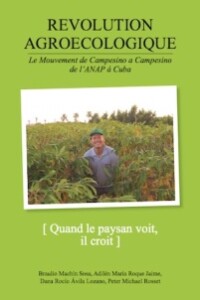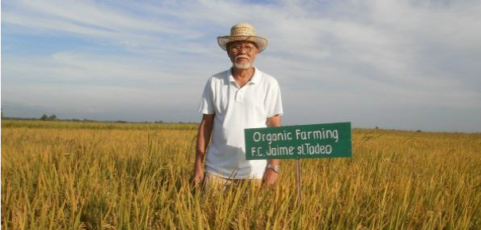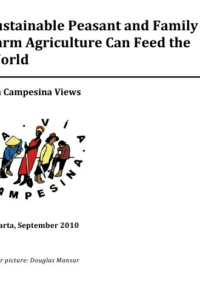This paper analyzes how peasant movements scale up agroecology. It specifically examines Zero Budget Natural Farming (ZBNF), a grassroots peasant agroecology movement in Karnataka, India. ZBNF ends reliance on purchased inputs and loans for farming, positioning itself as a solution to extreme indebtedness and suicides among Indian farmers. The ZBNF movement has achieved massive scale not only because of effective farming practices, but because of a social movement dynamic – motivating members through discourse, mobilizing resources from allies, self-organized pedagogical activities, charismatic and local leadership, and generating a spirit of volunteerism among its members. This paper was produced as part of a self-study process in La Via Campesina, the global peasant movement.
Peasant Agroecology for Food Sovereignty and Mother Earth, experiences of La Via Campesina
Our Solutions to the COP21 – New Notebook La Via Campesina – La Via Campesina is pleased to present study booklet number 7: “Peasant Agroecology for Food Sovereignty and Mother Earth, experiences of La Via Campesina”, which is the result of the collective efforts of various organizations from diverse regions including Africa, America, Europe and Asia. These groups make up part of our worldwide movement. From their distinct territories they shaped their experiences in agroecology training, organizing, production and marketing of healthy foods into 10 articles. This set of experiences represents a dynamic range of practices and knowledge, both for training within our movement and as a mechanism for additional knowledge exchange and rural-city dialogue.
This book also seeks to provide visibility of advocacy for Food Sovereignty which creates space for reflection, with examples from academic institutions, political allies and friends. We propose Peasant Agroecology as a way of production for rural communities, where Food Sovereignty constitutes a principle of life.
La révolution agroécologique.
Ce livre présente une synthèse de l’expérience paysanne cubaine et les conclusions du travail de systématisation de ce mouvement avant-gardiste, que les organisations paysannes du monde entier peuvent s’approprier et utiliser.
Organic farming at the Center stage in South East Asia
In a first part, this publication gives technical feedbacks and analysis on Sustainable Rice Based Farming Systems in the Philippines. The book concludes that Organic farming is undeniably, one of the best broad-based development strategies that can be employed to revitalize the agriculture sector. Read more
Sustainable Peasant and Family Farm Agriculture Can Feed the World
La Vía Campesina believe that agroecological food production by small farmers is the agricultural model best suited to meeting future food needs. Peasant-based sustainable farming systems based on agroecology and Food Sovereignty offer much hope.
Declaration of Sashe
From the 1st encounter of the agroecology trainers in the African region. 47 people from 22 organizations in 18 countries (Zimbabwe, Mozambique, Democratic Republic of the Congo, Rwanda, Angola, Uganda, Tanzania, Kenya, Zambia, South Africa, Central African Republic, Brazil, Mexico, Indonesia, Portugal, USA, France, and Germany). They met at the Shashe Endogenous Development Training Centre in Masvingo Province, Zimbabwe to plan how to promote agroecology in Southern, Eastern & Central Africa.






